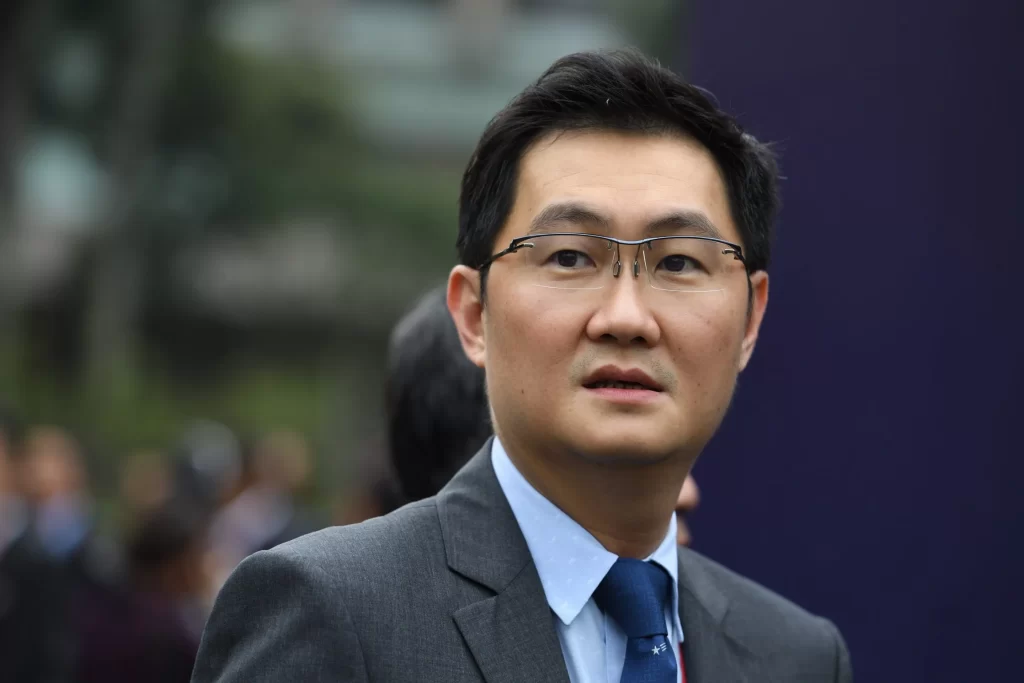
Ma Huateng, also known as Pony Ma, is a Chinese investor, politician, engineer, philanthropist, internet and technology entrepreneur who is known as the founder, chairman and chief executive officer of Tencent – one of the largest Internet and technology companies, and the biggest investment, gaming and entertainment conglomerates in the world.
Early life and education
Ma Huateng was born on October 29, 1971, in Badagang, Guangdong (now Dongfang City), China. Huateng accompanied his father Ma Chenshu when he got a job in Shenzhen as a port manager.
In 1989, Ma enrolled in Shenzhen University; and in 1993, he graduated with a degree in computer science.
Tencent and early career
After he graduated from college, Ma began working at China Motion Telecom Development (CMTD), a telecommunication company that was involved in the number of communication products and services, and he was responsible for the development of software for pagers. Ma reportedly earned $176 monthly. He also worked in the development and research department for Internet calling services at Shenzhen Runxun Communications Co. Ltd.
Simultaneously, Ma also kept toying with the idea of starting his own company and got in touch with four of his college classmates to make his business dreams come true. Ma co-founded Tencent, along with Chen Yidan, Xu Chenye, Zeng Liqing, and Zhang Zhidong in November 1998 as Tencent Inc.
In 1996, the company’s first product came after Ma participated in ICQ, a presentation of the world’s first Internet instant messaging service, founded by an Israeli company. Inspired by the idea, Ma and his team launched a similar software, with a Chinese interface and a slightly different name, OICQ (or, Open ICQ) in February 1999. The product quickly became popular; and by the end of 1999, it garnered over a million registered users, making the service one of the biggest in China.
In April 2000, the PCCW and IDG funded a total of $2.2 million in the company. In May 2001, during the private equity round, Tencent received $32 million from Naspers, with Charles Searle and Koos Bekker as the partner investors. Tencent secured a total of $36.8 million during the private equity round funding. Tencent had already settled in the Chinese telecommunications market, but to show profit and to prevent takeovers by larger companies, the company increased its operations. In 2003, they launched the company’s portal, QQ.com. It was considered as Tencent’s official incursion into the online gaming market.
Tencent’s success shot up rapidly within a year. It became the largest instant-messaging service provider by 2004, with a 74% stake in the Chinese market. The Hong Kong Stock Exchange-listed Tencent on June 16, 2004; and soon, the company increased $200 million, making Ma as one of the richest Chinese businessmen.
In 2004, Ma’s excellent marketing brain developed many further ideas associated with online gaming, such as selling virtual goods to support online gaming. It established the company’s influence. Ma also considered venturing into the e-commerce zone, around the same time, another fast-growing and highly profitable field.
In 2005, Ma launched Paipai.com, a direct competitor to China’s biggest e-commerce platform, Alibaba.com. By then, Tencent had become a massive force to reckon with, in the field of internet gaming, e-commerce, media, entertainment, and instant messaging.
Tencent had another significant breakthrough in 2011, when the company started another instant-messaging app, Weixin, known as WeChat in English. For the development of the app, Tencent practiced the same layout as Bill Gates had exerted for Microsoft. The company formed two teams to operate on the product simultaneously. Over time, WeChat became the most in-demand instant-messaging service worldwide. Most of the credit of its achievement goes to its easy interface and the inclusion of paid and unpaid emoticons and ringtones.
The biggest portion of Ma’s revenue came from online video games, which had grown a significant market in the 2010s, as access of the internet had become available by then. Tencent Games, a Tencent division operates toward the advancement of video games under Tencent Interactive Entertainment. Founded in 2003, Tencent Games became the largest video-game company in the world by 2018.
On June 26, 2018, Lippo Group invested $44.4 million for Tencent during the post-initial public offering equity round. According to Lippo in a statement, the investment would be done through its Hong Kong arm and would provide to the group’s digitalization.
Aside from managing its own gaming division, Tencent occupied significant stakes in many other gaming companies, such as Grinding Gear Games, Miniclip, Riot Games, and Supercell.
Other Tencent’s ventures include Tencent Pictures and Tenpay. While the former is a film-production company, the latter is an online payment system. In 2014, Tencent also collaborated with various influential music-production companies such as Warner Music Group and Sony for in-China distribution contracts.
Personal life
Ma Huateng is wedded to Wang Dan-ting. Ma Huateng’s fortune originates from the 9.7% stake in Tencent Holdings. Ma reportedly holds investments in Hong Kong and worth $150 million of art pieces.
As of March 2018, Ma is China’s richest man, and the world’s 14th wealthiest, with a net worth of $51.1 billion. On 21 November 2017, Ma exceeded both Sergey Brin and Larry Page to become the world’s ninth richest man, and the first Chinese to enter the listing of Forbes’ Top 10 richest men. As of May 4th, 2019, Ma Huateng’s net worth decreased to $43.2 billion and placed 20th at billionaires 2019.